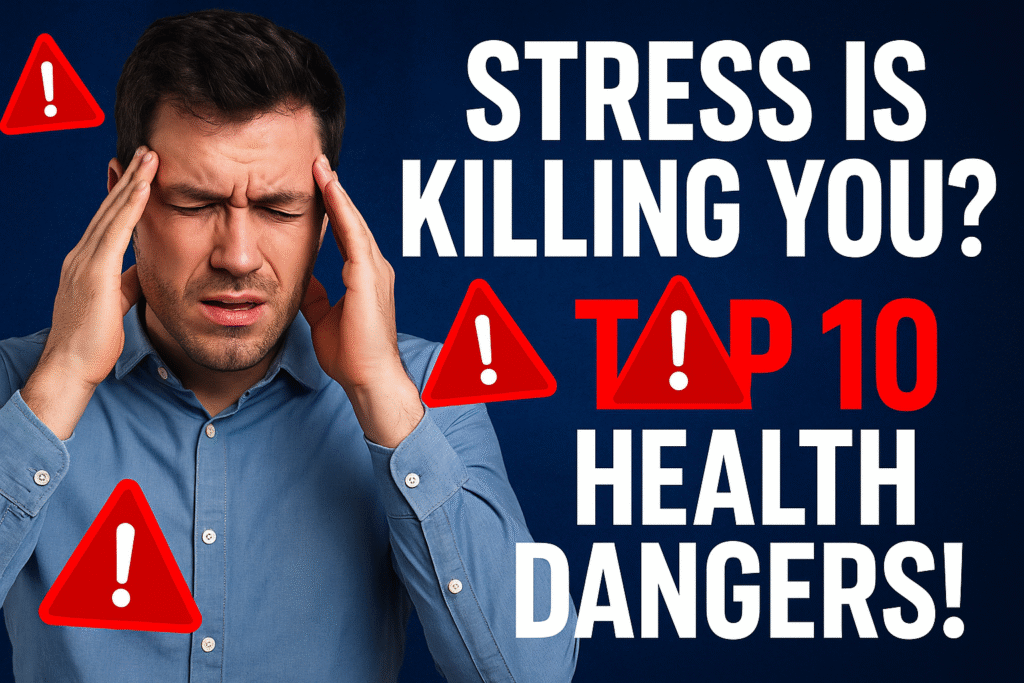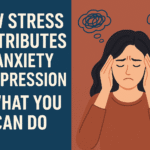We live in a world that never pauses. Emails flood in, deadlines loom, bills stack up, and
sometimes, even catching your breath feels like a luxury. But we hustle, grind , and push
through, that results in stress building up quietly – and its impact on our body and mind can be
far more dangerous than we realise.
Together in this blog , we will uncover the top 10 health issues caused by stress, exploring how
it affects our physical and mental well-being, the chronic risks it carries, and what you can do to
regain balance.
- Heart Disease and High Blood Pressure
Let’s begin with the heart – quite literally. Chronic stress forces your body into a continuous
“fight-or-flight” mode. This increases heart rate, constricts blood vessels, and raises blood
pressure over time.
According to many researchers and consultants, stress is a significant contributor to heart
disease, and persistent stress may lead to inflammation in coronary arteries.
This may pose a Long-term risk. Heart attacks, strokes, and hypertension are common in
individuals who experience prolonged emotional strain. - Anxiety and Depression
The effects of stress on mental health are deeply concerning. Chronic stress disrupts
neurotransmitter balance, especially serotonin and dopamine – the hormone chemicals that
regulate mood.
Symptoms to Watch: Restlessness, feelings of dread, panic attacks, lack of motivation, and a
deep , ongoing sense of sadness.
It is a pressing warning that unresolved stress can act as a trigger for anxiety disorders and
clinical depression, which require early diagnosis and support. - Digestive Issues
Ever had those big butterflies in your stomach before a big meeting or a major event? That’s
stress at work. But when stress becomes long-term, it wreaks havoc on your gut health. The
common outcomes: Irritable Bowel Syndrome (IBS), indigestion, bloating, diarrhea, or
constipation.
Stress can interfere with the communication between your brain and digestive system – a
relationship often referred to as the Gut-Brain Axis. - Weakened Immune System
Your body is a battlefield during stress as the body focuses on surviving. The immune system,
which protects you from viruses and bacteria, is significantly weakened under chronic stress.
One may wonder “ How does stress affect your body and mind?” This is how, first, it peaks
cortisol levels, which suppress immune response, making you more prone to infections like
colds, flu, or even autoimmune flare-ups.
Frequent illness could be your body signalling for help, seek help and support. - Sleep Disorders
Stress and Sleep don’t get along. When your mind races at night with to-do lists or worries,
falling or staying asleep becomes difficult. Stress-induced insomnia is real. It’s also linked to
nightmares, frequent awakenings, or waking up tired despite sleeping for hours.
Why does it matter: Poor sleep contributes to other chronic stress symptoms like fatigue,
irritability, poor concentration, sore shoulder muscles, tension build-up and even weight gain. - Weight Fluctuations
Stress has a complicated relationship with weight. Some people eat less , while others might
binge on comfort food – all thanks to stress. Cortisol, the stress hormone, increases cravings for
fatty and sugary foods – leading to emotional eating and weight gain.
Over time, this may increase the risk of obesity, diabetes, and metabolic disorders, especially if
stress is coupled with a sedentary lifestyle. - Muscle Tension and Pain
Stress makes your muscles tense up, often without you noticing – especially around your neck,
shoulders, and back.Chronic physical symptoms of stress include tension headaches,
migraines, jaw clenching, and even unexplained aches.
Over time, this strain can lead to posture problems, reduced flexibility, and chronic pain
conditions like fibromyalgia. - Skin Conditions
It’s not just internal. Stress can literally show up on your skin. Breakouts before a big event?
Flare-ups during an emotional phase? You’re not imagining it.
Stress worsens conditions like:
● Acne
● Eczema
● Psoriasis
● Hives or rashes
These are caused by inflammation and hormonal changes that affect the skin barrier, especially
when paired with poor sleep and eating habits. - Menstrual and Reproductive Problems
Stress can disrupt the reproductive system in both men and women. In women, chronic stress
may lead to irregular periods, painful cramps, or even missed cycles. In men, it may affect
sperm production and libido.For couples trying to conceive, stress can create a biological and
emotional barrier to fertility.
Doctors often highlight stress as a hidden but powerful contributor to infertility and hormonal
imbalance. - Memory and Concentration Issues
Do you forget things easily? Struggle to focus? Chronic stress impairs cognitive function by
affecting areas of the brain like the hippocampus, which is crucial for memory and learning.
Over time, stress-related cognitive decline can become more prominent – especially in older
adults. This mental fog can hinder work productivity, decision-making, and overall mental clarity.
Can Stress Be Managed? Absolutely.
Now that we’ve covered the top health problems linked to stress, the good news is – stress
is manageable with the right tools and support. Here are some best ways to reduce stress
for better health:
1 . Mindfulness and meditation: Just 10 minutes a day can lower cortisol levels and increase
emotional regulation.
2 . Physical activity: Exercise releases endorphins, improves sleep, and combats fatigue.
3 . Balanced nutrition: Eating whole, anti-inflammatory foods can support both the body and
brain.
4 . Journaling or therapy: Expressing emotions and addressing mental blocks is essential.
5 . Setting boundaries: Say no when needed, reduce screen time, and prioritize self-care.
It’s okay to not be okay and take time to heal ourselves. We only got one life afterall.If you find it
difficult to manage consult specialists.
Stress may be invisible, but its effects are deeply real and often underestimated. From your
heart and gut to your skin and sleep, every part of your body responds to prolonged emotional
strain. But with awareness comes power.
Start small, seek help when needed, and remember: Your health is worth more than any
deadline, expectation, or pressure!

